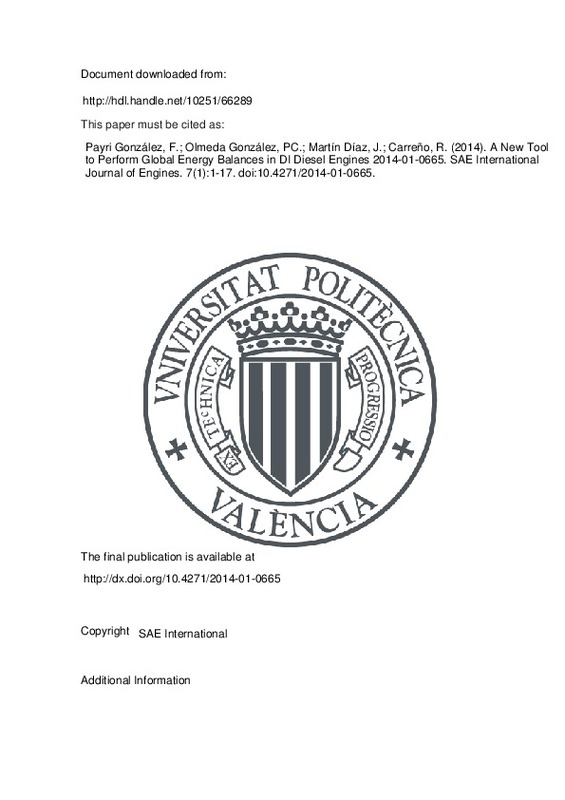JavaScript is disabled for your browser. Some features of this site may not work without it.
Buscar en RiuNet
Listar
Mi cuenta
Estadísticas
Ayuda RiuNet
Admin. UPV
A New Tool to Perform Global Energy Balances in DI Diesel Engines 2014-01-0665
Mostrar el registro sencillo del ítem
Ficheros en el ítem
| dc.contributor.author | Payri González, Francisco
|
es_ES |
| dc.contributor.author | Olmeda González, Pablo Cesar
|
es_ES |
| dc.contributor.author | Martín Díaz, Jaime
|
es_ES |
| dc.contributor.author | Carreño, Ricardo
|
es_ES |
| dc.date.accessioned | 2016-06-22T07:34:06Z | |
| dc.date.available | 2016-06-22T07:34:06Z | |
| dc.date.issued | 2014 | |
| dc.identifier.issn | 1946-3944 | |
| dc.identifier.uri | http://hdl.handle.net/10251/66289 | |
| dc.description.abstract | [EN] The generalization of exhaust aftertreatment systems along with the growing awareness about climate change is leading to an increasing importance of the efficiency over other criteria during the design of reciprocating engines. Using experimental and theoretical tools to perform detailed global energy balance (GEB) of the engine is a key issue for assessing the potential of different strategies to reduce consumption. With the objective of improving the analysis of GEB, this paper describes a tool that allows calculating the detailed internal repartition of the fuel energy in DI Diesel engines. Starting from the instantaneous in-cylinder pressure, the tool is able to describe the different energy paths thanks to different submodels for all the relevant subsystems. Hence, the heat transfer from gases to engine walls is obtained with specific convective and radiative models in the chamber and ports; the repartition of the heat flux throughout the engine metal elements towards the oil and coolant is estimated with a lumped capacitance model; finally, the ancillary systems and friction losses are obtained through specific semiempirical submodels. The validation of the tool is performed in a 4- cylinder DI Diesel engine instrumented to perform detailed experimental GEB. Finally, a simple analysis of combined internal and external analysis in the complete engine map shows the effect of operating conditions on each energy term. Thus it is demonstrated the utility of the proposed tool, that complements the experimental heat flow measurements in Diesel engine researches oriented to the reduction of energy consumption. | es_ES |
| dc.description.sponsorship | The support of the Universitat Politècnica de València (PAID06-09) and Generalitat Valenciana (GV/2010/045) is greatly acknowledged. | |
| dc.language | Inglés | es_ES |
| dc.publisher | SAE International | es_ES |
| dc.relation.ispartof | SAE International Journal of Engines | es_ES |
| dc.rights | Reserva de todos los derechos | es_ES |
| dc.subject.classification | MAQUINAS Y MOTORES TERMICOS | es_ES |
| dc.title | A New Tool to Perform Global Energy Balances in DI Diesel Engines 2014-01-0665 | es_ES |
| dc.type | Artículo | es_ES |
| dc.identifier.doi | 10.4271/2014-01-0665 | |
| dc.relation.projectID | info:eu-repo/grantAgreement/UPV//PAID-06-09/ | es_ES |
| dc.relation.projectID | info:eu-repo/grantAgreement/GVA//GV%2F2010%2F045/ | es_ES |
| dc.rights.accessRights | Abierto | es_ES |
| dc.contributor.affiliation | Universitat Politècnica de València. Departamento de Máquinas y Motores Térmicos - Departament de Màquines i Motors Tèrmics | es_ES |
| dc.description.bibliographicCitation | Payri González, F.; Olmeda González, PC.; Martín Díaz, J.; Carreño, R. (2014). A New Tool to Perform Global Energy Balances in DI Diesel Engines 2014-01-0665. SAE International Journal of Engines. 7(1):1-17. https://doi.org/10.4271/2014-01-0665 | es_ES |
| dc.description.accrualMethod | S | es_ES |
| dc.relation.publisherversion | http://dx.doi.org/10.4271/2014-01-0665 | es_ES |
| dc.description.upvformatpinicio | 1 | es_ES |
| dc.description.upvformatpfin | 17 | es_ES |
| dc.type.version | info:eu-repo/semantics/publishedVersion | es_ES |
| dc.description.volume | 7 | es_ES |
| dc.description.issue | 1 | es_ES |
| dc.relation.senia | 265724 | es_ES |
| dc.contributor.funder | Generalitat Valenciana | |
| dc.contributor.funder | Universitat Politècnica de València |







![[Cerrado]](/themes/UPV/images/candado.png)

